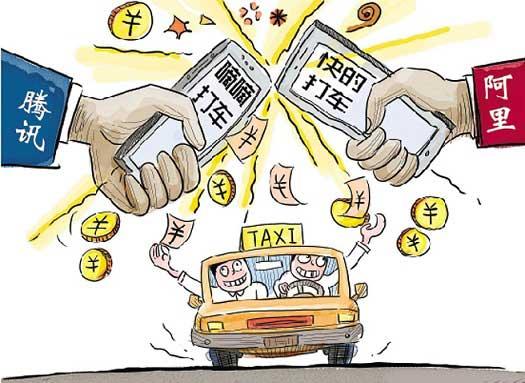Two Chinese internet giants are going head-to-head in a battle for hundreds of millions of mobile e-shoppers. They're spending billions on give-aways to subscribers who use their taxi-booking apps, shop on their online platforms, and use their e-payment services.
The Internet companies seem to be in a race to see which can burn the most cash. Tencent is giving taxi drivers and their passenger free money if they connect by using its aptly named phone app Didi Dache or Beepbeep call-a-cab.
 |
| Two Chinese internet giants are going head-to-head in a battle for hundreds of millions of mobile e-shoppers. They're spending billions on give-aways to subscribers who use their taxi-booking apps, shop on their online platforms, and use their e-payment services. |
Meanwhile, Alibaba has upped the ante giving drivers and passenger one yuan more than the Didi Dache give-away if they connect through its app Kuaidi -- Fast Cab.
"I will use Kuaidi for the first 5 to 10 fares, then I use Didi Dache. I’m making an extra 100 yuan a day." A taxi driver said.
"I take short cab rides four to five times a day and I’m saving 40 to 50. It means some rides are free." A passenger said.
Behind the app fight is a battle for bank accounts. Both Tencent and Alibaba are giving away billions of yuan to their subscribers, if they link their personal bank accounts to the companies’ e-commerce platforms.
“We’re investing 1 billion yuan into this round of cash rebates. We’re trying to re-enforce our subscribers’ payment habits, and keep our market share.” Chen Jun, East China Director of Didi Dache, said.
Alibaba’s Aplipay is currently the largest e-payment service, boasting about 10 million users. Tencent’s instant messaging service, Wechat, has more than 400 million users, all of whom are seen as potential on-line shoppers.
And Wechat hit a homerun over the Chinese New Year holiday with an app called Hong bao or Red envelope. It allowed Wechat users to send cash gifts -- a Lunar New Year tradition -- to other Wechat subscribers.
But again there was a catch. Both parties had to link their bank account information with their Wechat app.
"I received more than 100 yuan from friends but I haven’t linked my bank cards to Wechat. How am I supposed to get the money if I don’t attach my bank cards to Wechat?" A wechat user said.
Tencent’s WeChat mega hit got five million users to handover their bank info in just a few weeks. Its success seems to have sent shivers through Alibaba which has started to play hardball. It’s now blocking Tencent users from accessing its e-commerce site Taobao, an act that has angered both sellers and buyers.
Tencent, the underdog, hasn’t blinked. It's adding more pressure with the purchase of a 20 percent stake in Dazhongdianping, an app that links consumer with restaurants, stores and other services. Tencent is expected to pump many millions of yuan into subsidies for clients who use the app.
 |
| Two Chinese internet giants are going head-to-head in a battle for hundreds of millions of mobile e-shoppers. They're spending billions on give-aways to subscribers who use their taxi-booking apps, shop on their online platforms, and use their e-payment services. |
But some experts say the winner of this battle worth billions will have to offer more than cash giveaways.
“To be sustainable they’ll have to improve their product, and better meet costumers’ needs. The product with a future will have to have more value than just cash rebates.” Internet expert Xiang Ligang said.
With Tencent or Alibaba giving no quarter, the billion yuan giveaways are what a consumer would enjoy of. How long it lasts and what happens after it's over is anyone’s guess.







